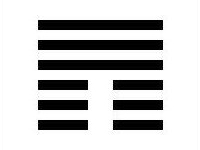
Hexagram 12 - P'i / Standstill (Stagnation) - James Legge Translation

- Above Ch'ien the Creative, Heaven
- Below K'un the Receptive, Earth
Meaning
P'i denotes being shut up and restricted. In P'i there is the want of good understanding between the different classes of men, and its indication is unfavorable to the firm and correct course of the superior man. We see in it the great gone and the little come.
Meaning Commentary
The form of P'i, it will be seen, is exactly the opposite of that of Thai. Much of what has been said on the interpretation of that will apply to this, or at least assist the student in making out the meaning of its symbolism. P'i is the hexagram of the seventh month. Genial influences have done their work, the processes of growth are at an end. Henceforth increasing decay must be looked for.
<-Prev Next->The Image
Heaven and earth do not unite: The image of Standstill. Thus the superior man falls back upon his inner worth in order to escape the difficulties. He does not permit himself to be honored with revenue.
Image Commentary
When, owing to the influence of inferior men, mutual mistrust prevails in public life, fruitful activity is rendered impossible, because the fundaments are wrong. Therefore the superior man knows what he must do under such circumstances; he does not allow himself to be tempted by dazzling offers to take part in public activities. This would only expose him to danger, since he cannot assent to the meanness of the others. He therefore hides his worth and withdraws into seclusion.
King Wans explanation
- The want of good understanding between the different classes of men in P'i, and its indication as unfavorable to the firm and correct course of the superior man; with the intimation that the great are gone and the little come: all this springs from the fact that in it heaven and earth are not in communication with each other, and all things in consequence do not have free course; and that the high and the low superiors and inferiors are not in communication with one another, and there are no well-regulated states under the sky. The inner trigram is made up of the weak and divided lines, and the outer of the strong and undivided: the inner is the symbol of weakness, and the outer of strength; the inner represents the small man, and the outer the superior man. Thus the way of the small man appears increasing, and that of the superior man decreasing.
Legge Footnotes on King Wans explanation
All the symbolism here springs from the trigram Kuan occupying in the figure the inner or lower place, and Ch'ien the outer or upper. It is for the inner trigram to take the initiative; but how can earth symbolized by Kuan take the place of heaven symbolized by Ch'ien? As in nature it is heaven that originates and not earth, so in a state the upper classes must take the initiative, and not the lower.
The Lines
The first SIX, divided, suggests the idea of grass pulled up, and bringing with it other stalks with whose roots it is connected. With firm correctness on the part of its subject, there will be good fortune and progress.
Naturally we should expect the advance of the subject of the first of the three weak lines to lead to evil; but if he set himself to be firm and correct, he will bring about a different issue.
The second SIX, divided, shows its subject patient and obedient. To the small man comporting himself so there will be good fortune. If the great man comport himself as the distress and obstruction require, he will have success.
Patience and obedience are proper for the small man in all circumstances. If the great man in difficulty yet cherish these attributes, he will soon have a happy issue out of the distress.
The third SIX, divided, shows its subject ashamed of the purpose folded in his breast.
The third line is weak. Its place is odd, and therefore for it incorrect. Its subject would vent his evil purpose, but has not strength to do so. He is left therefore to the shame which he ought to feel without a word of warning.
The fourth NINE, undivided, shows its subject acting in accordance with the ordination of Heaven, and committing no error. His companions will come and share in his happiness.
Does the ming of the fourth line mean the ordination of Heaven, as Ku Hsi thinks; or the orders of the ruler, as Khang-zze says? Whichever interpretation be taken and some critics unite the two, the action of the subject of the line, whose strength is tempered by the even position, will be good and correct, and issue in success and happiness.
In the fifth NINE, undivided, we see him who brings the distress and obstruction to a close, the great man and fortunate. But let him say, We may perish! We may perish! so shall the state of things become firm, as if bound to a clump of bushy mulberry trees.
The strong line in the fifth, its correct, place, brings the distress and obstruction to a close. Yet its subject the ruler in the hexagram-is warned to continue to be cautious in two lines of rhyme:
'And let him say,
"I die! I die I"
So to a bushy clump his fortune he shall tie.'
The sixth NINE, undivided, shows the overthrow and removal of the condition of distress and obstruction. Before this there was that condition. Hereafter there will be joy.
There is an end of the condition of distress. It was necessary, that condition should give place to its opposite; and the strong line in the topmost place fitly represents the consequent joy.
